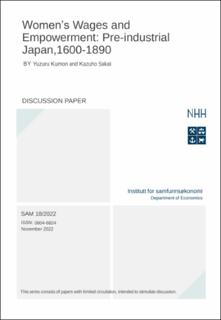Women’s Wages and Empowerment: Pre-industrial Japan, 1600-1890
| dc.contributor.author | Kumon, Yuzuru | |
| dc.contributor.author | Sakai, Kazuho | |
| dc.date.accessioned | 2022-11-17T07:44:06Z | |
| dc.date.available | 2022-11-17T07:44:06Z | |
| dc.date.issued | 2022-11-16 | |
| dc.identifier.issn | 0804-6824 | |
| dc.identifier.uri | https://hdl.handle.net/11250/3032289 | |
| dc.description.abstract | Using new evidence from servant contracts, 1600-1890, we estimate women’s wages in Japan. Women’s wages could only sustain 1.5-2 people up to 1900, the lowest recorded in the pre-industrial world. We then show the gender wage ratio was 0.7, higher than in Western Europe. Despite this, Japan had lower female empowerment for two reasons. First, absolute wages were low, so women were not economically autonomous. Second, landownership incomes were mostly earned by men, raising their bargaining positions. The low female empowerment in Japan could explain the early and universal marriage of its women unlike their empowered Western European counterparts. | en_US |
| dc.language.iso | eng | en_US |
| dc.relation.ispartofseries | SAM DP;18/2022 | |
| dc.title | Women’s Wages and Empowerment: Pre-industrial Japan, 1600-1890 | en_US |
| dc.type | Working paper | en_US |
| dc.source.pagenumber | 52 | en_US |
| dc.relation.project | Norges Forskningsråd: 262675 | en_US |
Tilhørende fil(er)
Denne innførselen finnes i følgende samling(er)
-
Discussion papers (SAM) [657]
